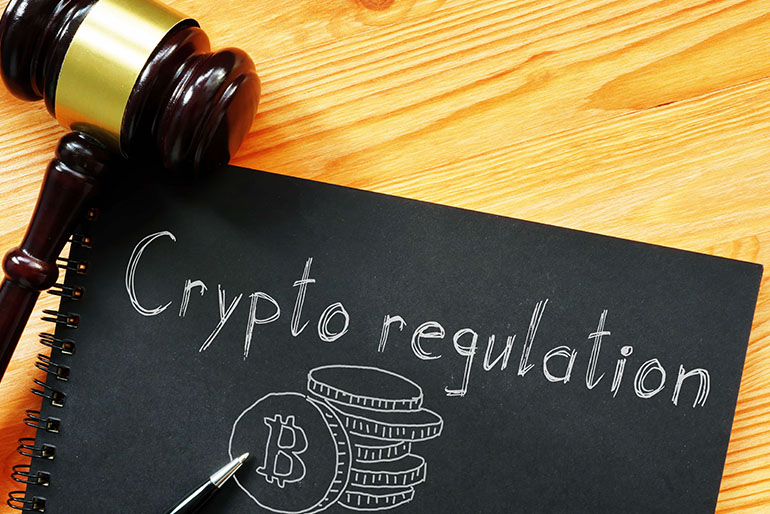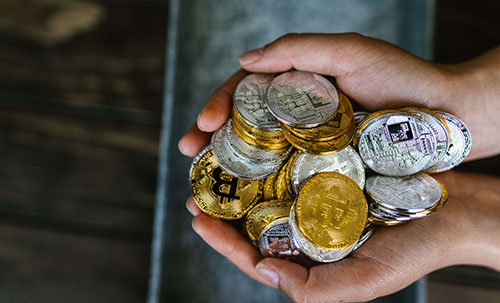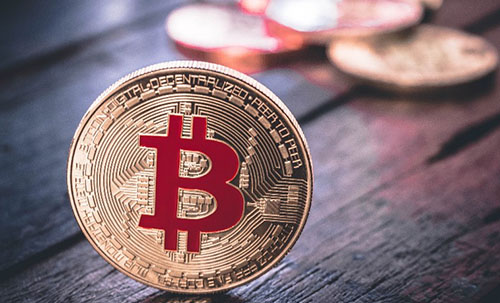Should cryptocurrency be regulated?

28 Aug 2023
Regulating cryptocurrency: should it be regulated? Who should do it? Is banning crypto a possibility?
The benefits of cryptocurrencies, compared to traditional financial instruments like cash, is a topic that attracts fierce debate. Central to any discussion of its value proposition is, in fact, its decentralised nature. Public permissionless blockchain networks, which underpin most of the largest cryptocurrencies by market capitalisation, remove intermediaries like the government, banks and other financial institutions from transactions, eliminating dependence and the need for trust in the systems they operate. Decentralisation is central to the spirit of crypto; some would even go so far as to say that the culture of crypto is one that is rebellious and anti-establishment1.
Hence, it is unsurprising that the idea of regulating the cryptocurrency ecosystem can be contentious. However, from an investor’s point of view, there are benefits to regulating such a relatively nascent and volatile market to detect fraudulent activity and ensure accountability. The crypto world is often referred to as the “Wild West”, after the US Securities and Exchange Commission (SEC) Chair Gary Gensler, because of how it is unstable, lacks regulatory oversight and full of risks2.
With the FTX collapse culminating a dramatic 2022 for the crypto market, what lies ahead for the future of cryptocurrency? Should governments and institutions leave the industry as it is, seek to regulate it, or – if it’s even possible – ban it completely? This is an especially pertinent question today, given how fast the crypto market capitalisation is growing. As of July 2023, the global crypto market cap is a staggering USD $1.18 trillion. It previously hit highs almost thrice that sum in 2021.
This issue was previously discussed at the Future of Finance Forum 2022, jointly hosted by DBS and the Bretton Woods Committee, and held in Singapore in November 2022. The panelists brought up the potential risks of the growing crypto market and bounced ideas around global cooperation for regulation.
But first, let’s delve into a bit of background around this issue.
Is there a need to regulate crypto?
The rise of cryptocurrency and its underlying blockchain technology has inspired many new possibilities for the future of finance and payments. In particular, you can read more about how it is transforming banking here.
However, beyond that, the cryptocurrency ecosystem is plagued by risks and rugpulls that have left many investors burnt. In November 2022, the crypto market suffered its biggest crash in years – erasing over USD 2 trillion – due to the collapse of FTX. The crash saw a “bank run” response, where many investors and institutions sought to quickly make withdrawals – but found their accounts and assets frozen. These events have led to regulators scrutinising the digital asset market and its participants more closely. Although crypto is likely to remain speculative and volatile, proper regulation could help prevent manipulation and fraudulent activity, and offer some level of accountability and investor protection.
But does this mean we should regulate crypto? If yes, who should do it? And how?
Why is it so hard to regulate cryptocurrency?
A key challenge with regulating crypto is that it transcends political borders – another key feature of the digital asset. It is global and accessible anywhere in the world to anyone with an internet connection.
The other issue that consistently comes up when discussing the feasibility of regulating crypto is how hard it is to define crypto as an asset. Whether it is a currency, security or commodity will influence the policies built to regulate it.
As its name suggests, cryptocurrency was originally designed to be a currency; that is, to store and transfer value in transactions. Yet, these days, it also functions as an investment instrument, much like securities. Gary Gensler, Chair of the US Securities and Exchange Commission, opines that cryptocurrencies are securities as they pass the “Howey Test” that lists the four criteria for an asset to be considered a security. However, he has also remarked that Bitcoin, the largest cryptocurrency by market capitalisation, should be treated as a commodity rather than a security, further complicating how cryptocurrencies should be treated and regulated in the United States.
Finally, overbearing intervention in the market could become a barrier to innovation, and trigger an exodus of service providers to jurisdictions with less regulatory scrutinty. This could prove detrimental to the market overall, as service providers which do so would now face less oversight while still offering their services to investors in other markets, given the borderless nature of cryptocurrencies.
Whose responsibility is it to regulate cryptocurrency?
In the Future of Finance Forum 2022, DBS CEO and moderator of the regulator’s panel, Piyush Gupta, brought up the debate around regulating and possibly even banning cryptocurrency exchanges.
He cited reasons such as anti-money laundering (AML), Know Your Customer (KYC) and monetary policy issues. He posed the question of who can and has the regulatory authority to do it.
In response, Shri T Rabi Sankar, Deputy Governor, Reserve Bank of India, explained that the solution would be in some form of global cooperation. “In terms of banning, I do agree no single country can do it, which is probably the reason why the finance minister has talked very often on the fact that for something which exists in the virtual space, regulation cannot be in one place, with one state, or one country.
“This regulation has to be global, not in terms of who is implementing the regulation, but in terms of understanding what are the objectives of regulations, what are the tools of regulations that can happen, and what is the nature of the products that are being regulated. That is extremely important,” said Rabi.
Continuing the conversation, Piyush asked William C Dudley, Chair, Board of Directors and Co-Chair, Digital Finance Working Group, Bretton Woods Committee; former President, Federal Reserve Bank of New York, about US’ stance on the matter. This was sparked by a question from the audience: Since most private crypto capital effort is driven and made in the US, is it actually in America's interest that there is no global cooperation on building a consensus on crypto policies?
To that, William disagreed, acknowledging the pace at which the crypto market is growing and its impact on the world now.
“When the space wasn't very big, you didn't really worry about the financial stability risk because, you know, if it collapsed, a few people would be hurt, but it wouldn't be big enough or broad enough to have huge consequences for the global economy. But as it gets larger and larger, I think the financial stability risks are becoming more potentially acute,” he said.
He also brought up the Terra (Luna) crash that happened in 2022, explaining that while most of the US escaped unscathed, it hit South Korea significantly. “There was a lot of money in Korea that was invested in that algorithmic stablecoin, and people took tens of billion dollars of losses,” he said.
For more insights, watch the full discussion here:
The discussion also covered the debate around “private” cryptocurrencies and Central Bank Digital Currencies (CBDCs), central bank-issued fiat on a blockchain-based ledger. Read more here.
Cryptocurrency regulation in Singapore
The Singapore government is experimenting with the use of blockchain technology and DeFi with initiatives such as Project Orchid, Project Guardian and the completed Project Ubin, all of which DBS has supported and been a part of.
In November 2022, DBS partnered with Open Government Products (OGP) to pilot the use of purpose bound money (PBM), which adopts smart contracts technology for programmable digital payments. That month, DBS partnered SBI Digital Assets Holdings to conduct foreign exchange and government bond transactions against decentralised finance liquidity pools. DBS will also be participating in new pilots this year to explore PBM-based rewards and the execution of a repurchase agreement with natively issued digital bonds.
In terms of cryptocurrency regulation specifically, the Monetary Authority of Singapore (MAS) published two consultation papers on proposed regulatory measures in October 2022. The findings were recently released on 3 July 2023.
As part of the Payment Services Regulations, MAS will require Digital Payment Token (DPT) service providers to safeguard customer assets under a statutory trust, separate from the service provider’s assets, to mitigate the risk of loss or misuse of customers’ assets. DPT service providers will also be restricted from facilitating lending and staking of DPT tokens for their retail customers.
MAS has acknowledged that, given the “supporting role in the broader digital asset ecosystem”, we should not ban them. However, trading crypto is still considered “highly risky and not suitable for the general public”.
In December 2020, DBS launched one of the world’s first bank-backed digital exchanges – DBS Digital Exchange (DDEx). DDEx is presently only open to corporate and institutional clients, family offices, accredited investors and eligible wealth clients of the bank. Learn more about DDEx here.
1: Anti-establishment wave to help push blockchain into real world in 2017

